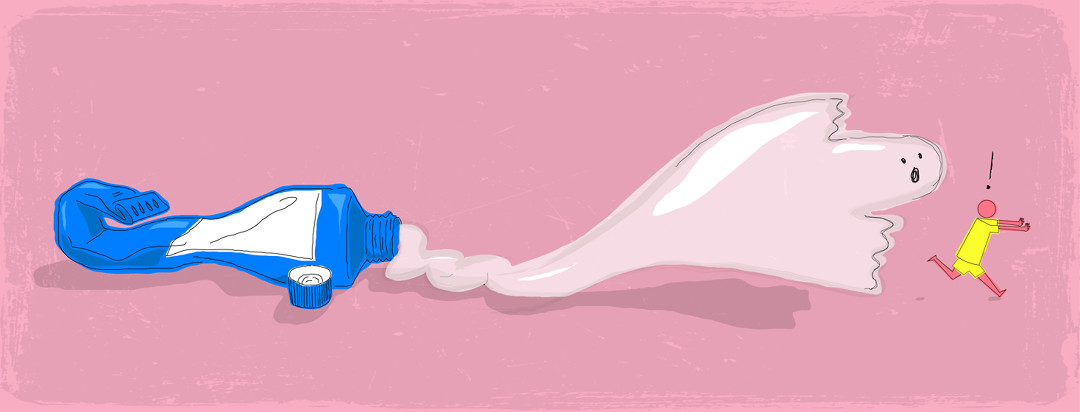Why I Don't Use Petroleum Jelly Anymore
If you take a look at the average medicine cabinet of an eczema warrior, you are bound to find a tube of petroleum jelly.
Growing up using petroleum jelly
As a person who has lived with eczema since I was two months old, I can’t remember a time when I didn’t own petroleum jelly. Everywhere I went, my tube of jelly came with me. It was the only thing that I felt would moisturize my skin and get rid of the extensive dryness. Anytime I felt my skin getting itchy, I applied petroleum jelly. After every shower, I applied petroleum jelly. When my skin would dry up, guess what I did? Yup! I applied petroleum jelly. It was my go-to moisturizer in and outside of the home.
What I didn’t like about petroleum jelly
While I enjoyed the feeling of knowing that my skin was momentarily smooth and no longer flaky, there were factors that made petroleum jelly unappealing to me:
- It was extremely thick and greasy
- It would get all over my clothes
- My skin would dry up more frequently
But at this time, this was the only product that made me feel good and the only moisturizer that felt like it was making a difference with my skin. It was not until 22 years later that I found out the extreme use of petroleum jelly may actually be causing my eczema more harm than good.
History of petroleum jelly
Unrefined petroleum jelly or petrolatum is a byproduct of oil, that was originally used to coat the bottom of oil rigs in the mid-1800s. The same petroleum we use in our cars and lawn mowers today. Over time, people realized that it helped heal cuts and burns, which has been its main use up until today.1 This is when, Vaseline, the most popular brand name of petroleum jelly, was founded in 1870 by Robert Chesebrough.
Nowadays, there are a variety of products and chained pharmacy stores like CVS that produce their very own types of petroleum jelly. It is also a cheap product that is often used in cosmetic preparations that are sold as moisturizers.
Why I don't use petroleum jelly
While petroleum jelly has and continues to play a prominent role in skincare, there are a few reasons why I have turned to natural alternative products that not only work better long term but also may be healthier, too.
No nourishment
Petroleum jelly certainly gives the appearance of hydrated and moisturized skin, however, there is nothing that is in it that actually nourishes the skin. No vitamins, fatty acids – nothing. It’s similar to being hungry and eating junk food. Yes, I am full temporarily, but the food does not nourish my body as a whole.
It's an occlusive
Petroleum Jelly is an occlusive agent, meaning that it physically prevents water loss. In fact, a medical study done in 2005 shows that petroleum jelly reduces transepidermal water loss (TEWL) by 98%.2
Other recent studies of high-risk allergic individuals showed that an increase in TEWL may create the clinical manifestation of atopic dermatitis in those at high risk of allergic diseases. “A defect in skin barrier function may facilitate allergen entry and immune priming.”3
Clogged pores
This agent can create the illusion that your skin is hydrated and moisturized when in fact it can be suffocating your pores. Its thick gel creates an impenetrable barrier, trapping moisture within while simultaneously protecting the skin from outside factors like water, air, and bacteria. However, because of the jelly’s occlusive ingredients that sit on top of the skin, it can plug pores and make it difficult to wash off, creating build-up.
Infection
While petroleum jelly protects the skin from outside factors, it also prevents it from expelling toxins and bacteria that may already exist. Not allowing the skin to dry or cleaning the skin properly before applying petroleum jelly can cause fungal or bacterial infections. Slathering on this product on unwashed body parts can trap the dirt located on the surface of your skin.
Collagen breakdown
The barrier that petroleum jelly creates on the skin causes some concern about its potential to cause collagen breakdown.4 This essential protein provides the body with benefits, like elasticity to the skin, youthfulness, glow, moisture, and more. Due to its thick coat, petroleum jelly blocks the skin’s natural ability to breathe and absorb nutrients. This, in turn, can slow down our body’s cell renewal process.
Petroleum jelly is not my solution
In my opinion and based on my research, petroleum jelly provides an instant gratification without a real solution. If your goal is to simply hold in moisture and you are not concerned about its pore-clogging potential, then petroleum jelly might be useful. However, if you’re looking for natural occlusive products that can soothe, soften, and heal the skin and are healthy for you in the long run, then maybe it’s time to put a hold and/or limit your use of petroleum jelly.
Community Poll
Do you use petroleum jelly?
Community Poll
Do you have experience with TSW?

Join the conversation